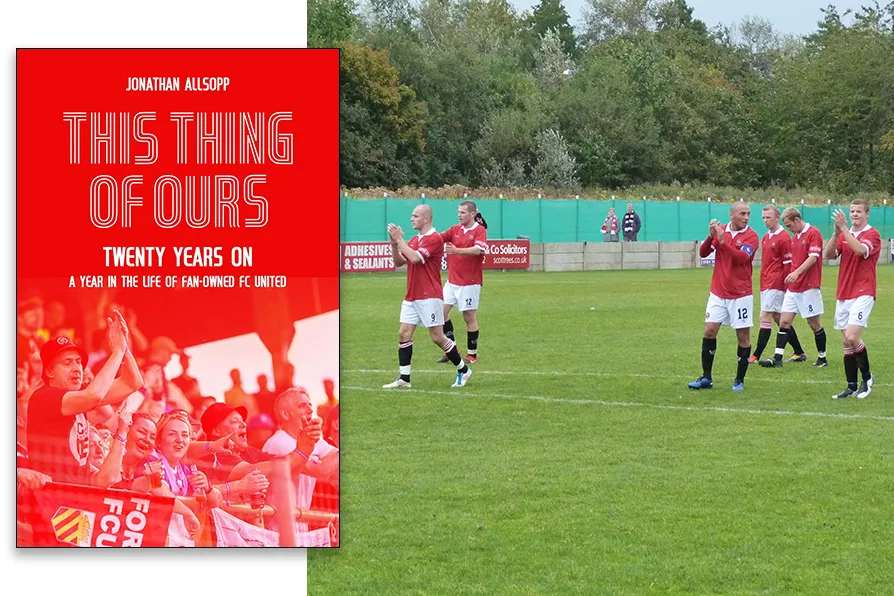Releases from Rahsaan Roland Kirk, Maggie Nicols/Robert Mitchell/Alya Al Sultani, and Gordon Beck Trio and Quintet
STEVEN ANDREW welcomes a fine introduction to FC United of Manchester, the team set up in opposition to Manchester United

 TEAM SPIRIT: FC United players thank fans for their support after a game at Skelmersdale against Buscough FC, 2011 [Pic: Delusion23/CC]
TEAM SPIRIT: FC United players thank fans for their support after a game at Skelmersdale against Buscough FC, 2011 [Pic: Delusion23/CC]
This Thing of Ours: Twenty Years on, a Year in the Life of Fan-Owned FC United
Jonathan Allsopp, Pitch Publishing, £18.99
DISGUSTED by the profiteering of widely hated Manchester United owners the Glazer family, a group of fans got together in a curry house 20 years ago and decided to form their own community-based team as an alternative. FC United, England’s largest wholly fan owned football club, was the result and an exciting and often controversial journey it’s been for them since.
In the early years, FC ploughed their way up through the minor leagues in a way that no-one could have predicted, and after a decade of playing at other grounds, even managed to secure their own purpose-built stadium at Broadhurst Park in Moston, north Manchester. Since then, it would be fair to say that the football hasn’t always been of the highest standard but although gates don’t match the flurry and dizziness of the founding period the club retains a loyal, energetic and passionate following who aren’t shy in coming forward both with praise, and often abuse, when they see fit.
Johnathan Allsopp was an enthusiastic supporter from the word go, and more recently has deepened his involvement by becoming a member of the board. Well placed to write this wonderfully detailed and affectionate account, he comes across as a very personable and engaging individual.
He is also someone who, like many FC United supporters, is more than open about his progressive politics, to say the least. In a lot of ways the book put me in my mind of the writing of Stuart Maconie and Harry Pearson, both of whom have a similar ability to write readable, semi-autobiographical and sometimes humorous accounts about working-class movements and life experiences that are all too often caricatured, if not ignored altogether.
FC united was founded on the basis of seven core principles: namely, a democratically elected board, decisions to be made on a one member one vote basis, keeping admission prices affordable, developing strong ties with community, and becoming as accessible as possible, striving to avoid outright commercialism, encouraging young local participation — playing and supporting — and being a non-profit organisation.
To what extent has it abided by them since?
Allsopp feels that it has done so to a large extent and puts forward the case for this more than convincingly. As part of this, he makes the seminal point that it’s one thing to position yourself as a “Punk” football club that was born out of protest, and quite another to structure it as a business, with the marketing skills and strategy necessary to keep the club afloat and plan for the future.
The club has had a fair number of staffing issues and Allsopp reviews these at length. Inviting the then Tory Party minister of sport to the matchday ground on the week when the Conservatives had their party conference in the city and had been barracked by thousands of protesters, including many from FC United itself, wasn’t the best of ideas!
Striking a balance between the different founding principles of the club is an ever shifting and often impossible task, made all the more challenging by the fact that you are certainly never going to please everyone. And let’s be honest, given that football culture in the UK and further afield is often all about having a good moan, why should a more progressive, supporter owned, and community-inclusive club be any different ?
The amount of time that Allsopp spends setting out the club’s finances in terms of costs and expenditures doesn’t make for the most exciting of reads and although understandable is sometimes a little overdone and over-defensive. There’s possibly a little too much time given over to looking at the background and motivations of those currently occupying executive positions as well. The regular inclusion of anonymised online comments from The Soul Is One website is a welcome exception to this but the inclusion of some lengthier contributions from fans, staff and players would have strengthened the overall narrative.
FC United is as much about the women’s team as the men’s and Allsopp makes sure to document their fortunes. There is no other club willing to officially celebrate International Women’s Day to the extent of creating a special jersey in suffragette colours — a movement with particular relevance for all Mancunians. Likewise, FC has always had a stridently anti racist and anti-fascist following and this continues through to today. Violent protests outside a refugee hostel last year, for example, saw FC United fans delivering free tickets to the residents in days after as a gesture of welcome that few other clubs would even think of.
Finally, Allsopp’s regular mention of the pre-match event “Course you can Malcom” brings home that there is so much more to the game than football, important though the latter is.
One of the best football books I’ve had the privilege to read and a fine introduction to a unique team that has overcome all the odds. See you on the terraces!

In the shadow of Heathrow and glow of Thorpe Park, a band of Arsenal loyalists have built something lasting — a grassroots club with old-school values, writes LAYTH YOUSIF













